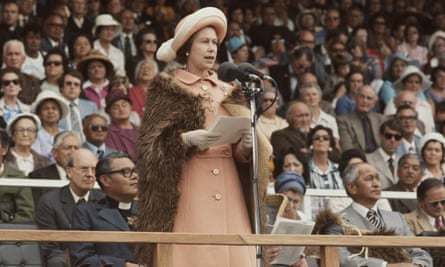Jacinda Ardern, New Zealand’s prime minister, has remembered Queen Elizabeth II as “extraordinary” in remarks echoed by leaders across the political spectrum as the country marked its first day of mourning for the monarch’s death.
“Over her reign, she has come to define notions of service, charity and consistency,” Ardern told reporters at parliament in Wellington on Friday. Queen Elizabeth’s commitment to her role was “without question and unwavering,” Ardern said.
“She has also demonstrated courage, compassion and humour.”
New Zealand’s other political leaders struck admiring – and sometimes restrained – notes in their tributes to the Queen, including those who, like Ardern, have described themselves as republicans, or have campaigned on reversing the damaging effects of Britain’s colonisation of New Zealand on its Indigenous people.
The relationship between the British crown and New Zealand – a country increasingly attempting to envision its own youthful and multicultural identity – was “a question for another day,” said Marama Davidson, the co-leader of New Zealand’s Green party.
Plans are under way for a state memorial service to be held in New Zealand after the Queen’s funeral, which Ardern is expected to attend, and a period of mourning would continue until then.
An exception will be made on Sunday, when a proclamation ceremony will be held to acknowledge King Charles III, who has become New Zealand’s head of state.
In the condolence book at parliament house, Ardern wrote: “With our deepest gratitude for your love for the people of Aotearoa New Zealand, and for your life of service.”
She followed the words with the Māori proverb “he kotuku rerenga tahi”, which translates to “a white heron’s flight is seen but once”. It refers to a rare event, and the comparison is intended as an honour.
In an earlier statement, Ardern described the Queen as “a much-respected constant through unprecedented global change.” Ardern expected New Zealanders would feel “deep sadness, but also deep gratitude” at the monarch’s passing.
On the surface, little will change in New Zealand’s daily life under a new monarch, and the mood in Wellington on Friday reflected that.
Those who arrived at the designated spot outside parliament for floral tributes were mostly there to eat lunch on a sunny spring day, and only a trickle of mourners visited two official condolence books to leave their regards.
But the change of monarch is likely to prompt further debate about New Zealand’s future. While contemporary New Zealand leaders have viewed a shift away from the monarchy as inevitable, most have expressed reluctance to suggest any kind of timeline.
Public debate about the possibility of New Zealand becoming a republic would “build up quite a head of steam now,” Sir Don McKinnon, a former deputy prime minister of Aotearoa and former secretary-general of the Commonwealth told Radio New Zealand.
“I can say from all the conversations I had with Her Majesty in her time, she was always prepared to say […] it’s entirely up to all of those realms […] where she’s head of state whether they want to stay that way.”

In 2021, Ardern told reporters that she believed the country would become a republic in her lifetime, but that she “never sensed urgency” from New Zealanders about the change.
On Friday, Ardern focused on New Zealand’s special relationship with the Queen, who she said had been thoughtful and comforting during several national crises over the decades
Queen Elizabeth’s laughter and the “level of knowledge and care that she had for New Zealand” would be Ardern’s fondest memories of the monarch, she said, referring to a phone call between the pair during the country’s first Covid-19 lockdown in 2020.
“She called just to check on how New Zealand was doing,” Ardern said. “It was a very human conversation.”
Ardern added: “I think it’s easy to believe that when you’re in such a role that somehow you get a distance from others or from what it is to be human. I never ever got that sense from her.”
The Queen visited New Zealand 10 times, the first over the summer of 1953-54 when she and the Duke of Edinburgh visited 46 cities and towns and attended 110 functions.
Queen Elizabeth had also given Ardern – who was the first head of state in recent years to give birth while in office – advice about balancing leadership with raising children, Ardern said.
Lawmakers will pay tribute to the Queen at a sitting of New Zealand’s parliament on Tuesday.
Christopher Luxon, the leader of the parliamentary opposition and New Zealand’s centre-right National party, said the “strength and stability” of Queen Elizabeth’s leadership “was a reassuring anchor for New Zealand and New Zealanders in uncertain and changing times”.
Davidson, of the Green party, remembered a ruler who “cared deeply” about Aotearoa, and “carried out her duties with a remarkable sense of grace and integrity”.
David Seymour, leader of the libertarian party, Act, said: “She has supported hundreds of charities and is estimated to have helped raise well over a billion dollars to worthy causes. She has done more for charity than any other monarch in history, potentially any other individual.”
We all mourn the passing of this Ariki. The huge vacuum left will cause debate, but in this time of grief and loss we can only support her Whānau and Mokopuna as they grieve and heal. She was a constant across three generations, an anchor in a rapidly changing globe.
— Rawiri Waititi MP (@Rawiri_Waititi) September 8, 2022
“She was a constant across three generations, an anchor in a rapidly changing globe,” Rawiri Waititi, co-leader of Te Pāti Māori (the Māori party), said in a tweet.
He added, using the Māori words for ‘family’ and ‘grandchildren’: “The huge vacuum left will cause debate, but in this time of grief and loss we can only support her Whānau and Mokopuna as they grieve and heal.”